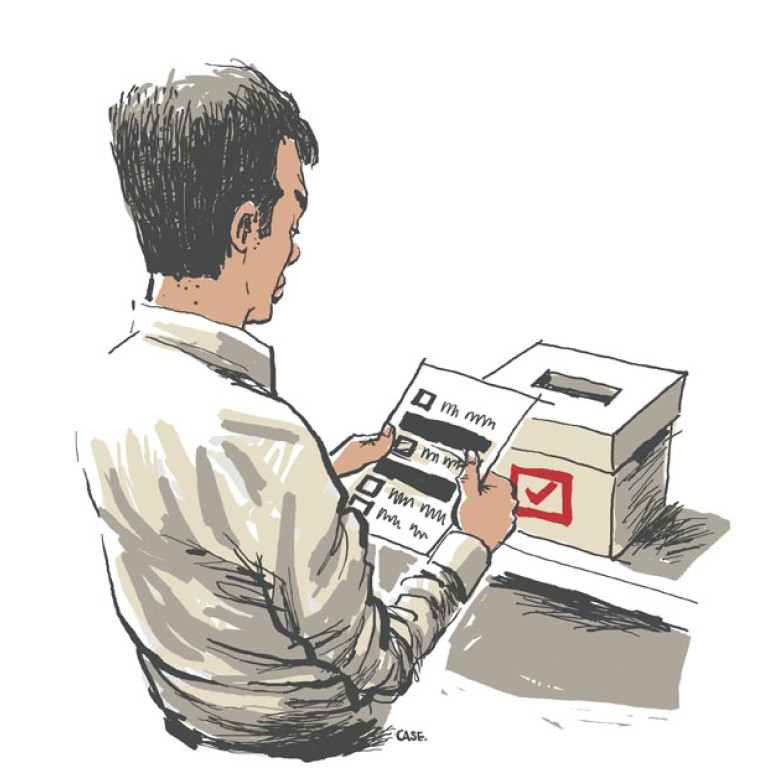
Beijing must keep its word on universal suffrage
Emily Lau says Beijing must keep its promise on universal suffrage in 2017, and trust that the people of Hong Kong, given a free choice, will elect a chief executive acceptable to all sides
With the government's public consultation on political reform drawing to a close, Beijing decided to invite all Legislative Council members to Shanghai. The visit, last week, included a meeting with mainland officials in charge of Hong Kong affairs. This enabled the 10 pro-democracy legislators who joined the trip to hold rare talks with Beijing officials on constitutional reform. The last time such discussions took place was in 2010.
According to the Basic Law, the earliest opportunity for the Hong Kong people to elect the government by universal suffrage was in 2007, 10 years after the change of sovereignty. However, this move has to be approved by Beijing and, regrettably, it was put back by a decade.
The stark reality is that Beijing will not allow Hong Kong people to elect the chief executive by universal suffrage, even in 2017.
As far as I can see, there's less than 1 per cent chance of this happening. Despite such a bleak outlook, many Hong Kong people still expect the pro-democracy political parties to fight for universal suffrage in 2017.
Beijing must overcome its concern that the situation in Hong Kong may get out of hand
Thus, we will fight even for that 1 per cent chance of change.
Hong Kong people have high expectations of a chief executive election by universal suffrage by 2017. Public opinion surveys conducted over the years have repeatedly shown that the majority want the right to elect the government by universal suffrage. Pro-democracy candidates, including myself, who have stood for direct elections for Legco since 1991, have all embraced such a platform and have consistently been re-elected.
Following Legco's passage of the limited political reform package in 2010, paving the way for elections of the chief executive, and the legislature in 2012, Beijing has given the undertaking that Hong Kong may choose the chief executive by universal suffrage in 2017 and, after that, all Legco members will also be elected by universal suffrage.
However, central officials have repeatedly said that anyone who seeks to confront the central government would not be allowed to stand for election, let alone be chosen as chief executive. To prevent this from happening, Beijing will only allow candidates they trust to stand for election. Hence, they will use the nominating committee to screen out undesirable candidates. In short, Beijing demands a one-person, one-vote election which carries zero risk.
To the Democratic Party, that is unacceptable. Election by universal suffrage does not only mean voters have the right to vote, but people with different political views should be able to be nominated as candidates. It should be a competitive election in which voters have genuine choice, rather than only being able to choose from among candidates from the pro-establishment camp.
Some commentators have said we will be satisfied as long as a pro-democracy candidate can be nominated to stand for election. This is not true. We want a free and fair election which allows candidates with different political views to take part.
Some pro-Beijing figures have urged us to accept a zero-risk one-person, one-vote election in 2017, saying the system could be improved in future. My reply is "no".
In 2010, the Democratic Party supported an election package which did not provide for universal suffrage in 2012. We did it because we saw it as a step forward, thus satisfying the Basic Law requirement that the chief executive election should be in accordance with the principle of gradual and orderly progress. Because my party helped to break the impasse and got the package passed in Legco, Beijing gave the undertaking that the chief executive could be elected by universal suffrage in 2017, and direct elections for Legco would follow.
Beijing must now deliver on that promise. During the meeting in Shanghai, our members had the opportunity to talk to Beijing officials face to face. That was a good start. Our message to Beijing is that it should trust the Hong Kong people, most of whom, as Deng Xiaoping once said, "love the country, love Hong Kong". If given a free choice, Hong Kong people would elect a chief executive who can get the support of both the people and the central government.
To allow such a free election to take place, Beijing must overcome its concern that the situation in Hong Kong may get out of hand, and that foreign forces have infiltrated political parties and will use them to subvert the central government.
On the other hand, if Beijing insists on manipulating the electoral process to produce a fake election by universal suffrage, it definitely will not receive the support of my party.
The government's public consultation is led by the chief secretary, Carrie Lam Cheng Yuet-ngor, who has said that she is not optimistic that the government's proposal will secure the support of at least 47 lawmakers, two-thirds of Legco, a requirement stipulated in the Basic Law.
In the coming weeks and months, we would welcome discussion with mainland officials and people from the pro-establishment camp.
We will urge Beijing to trust the Hong Kong people and keep its promise on universal suffrage in 2017. If not, as Legco president Jasper Tsang Yok-sing has warned, Hong Kong could become ungovernable.

